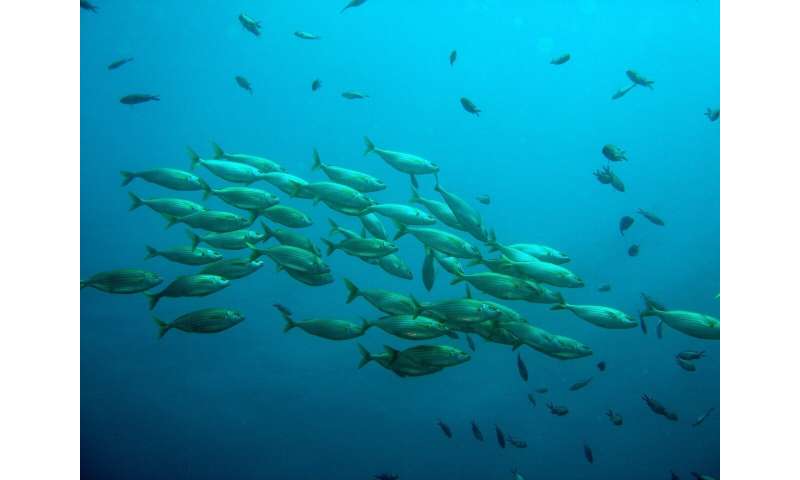#Small fish populations accumulate harmful mutations that shorten lifespan
“#Small fish populations accumulate harmful mutations that shorten lifespan”

Population bottlenecks contribute to the accumulation of several harmful mutations that cause age-related illnesses in killifish—a finding that may help answer a key question about aging.
The study, published today in eLife, reveals why killifish accumulate harmful mutations that cause age-related conditions such as cancer or neurodegenerative diseases that shorten lifespan. This may help scientists better understand how lifespan evolves among populations and may lead to new insights on human aging.
The very short lives of turquoise killifish—between three and nine months—make them an ideal model for studying aging. Killifish live in temporary ponds in Africa that dry up for part of the year, meaning they must hatch, mature and reproduce before this happens. Their eggs survive the dry periods in a hibernation-like state and hatch when rains fill the pond again, starting a new generation.
“Different wild turquoise killifish populations have varying lifespans, and we wanted to explore the reasons behind this,” explains lead author David Willemsen, Postdoctoral Research Fellow at the Max Planck Institute for Biology of Ageing, Cologne, Germany.
For their study, Willemsen and senior author Dario Riccardo Valenzano carried out field work in savanna pools in Zimbabwe to catch and collect genome samples from the killifish for sequencing and analyzing in the lab. The team then compared the genomes of killifish living in the driest environments, which have the shortest lives, with the genomes of killifish from wetter environments, which live for months longer.
The short-lived killifish have very small, often isolated populations, leading to so-called population bottlenecks which, the team found, result in harmful mutations accumulating in their populations. By contrast, the longer-lived killifish have larger populations and new fish with new genetic material frequently join their populations. Over time, these larger populations make it more efficient for natural selection to remove harmful mutations.
“Limited population sizes caused by habitat fragmentation and repeated population bottlenecks increase the chance for harmful mutations to accumulate in the population,” Willemsen says. “Our work may help answer a key question about aging by suggesting that population dynamics, rather than evolutionary selection for or against specific genes, contribute to this accumulation of harmful mutations that result in aging and shorter life.”
The results support a model where, given the brief rainy seasons, killifish are under strong selective constraints to survive in the absence of water as dormant embryos and to rapidly reach sexual maturation and reproduce before the water completely evaporates. However, the team believes that killifish are not selected to be short-lived. Instead, harmful mutations that affect late-life survival and reproduction (together causing aging in the killifish) accumulate over generations without being constrained by selection.
“Harmful mutations passively accumulate in killifish populations, and this is even more prominent in smaller populations which happen to live in drier environments,” says senior author Dario Riccardo Valenzano, Group Leader at the Max Planck Institute for Biology and Ageing, and Principle Investigator at CECAD, the Cluster of Excellence for Ageing Research at the University of Cologne, Germany. “Our findings highlight the role of demographic constraints in shaping lifespan within species and could potentially be expanded to provide new insights on aging within other animal and human populations.”
More information:
David Willemsen et al, Intra-species differences in population size shape life history and genome evolution, eLife (2020). DOI: 10.7554/eLife.55794
Citation:
Small fish populations accumulate harmful mutations that shorten lifespan (2020, September 1)
retrieved 1 September 2020
from https://phys.org/news/2020-09-small-fish-populations-accumulate-mutations.html
This document is subject to copyright. Apart from any fair dealing for the purpose of private study or research, no
part may be reproduced without the written permission. The content is provided for information purposes only.
If you want to read more Like this articles, you can visit our Science category.
if you want to watch Movies or Tv Shows go to Dizi.BuradaBiliyorum.Com for forums sites go to Forum.BuradaBiliyorum.Com




